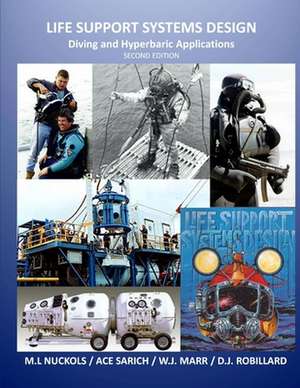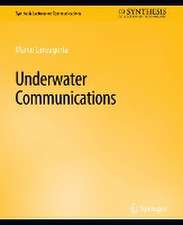Life Support Systems Design
en Limba Engleză Paperback
Preț: 541.17 lei
Preț vechi: 668.12 lei
-19% Nou
Puncte Express: 812
Preț estimativ în valută:
103.55€ • 108.13$ • 85.51£
103.55€ • 108.13$ • 85.51£
Disponibil
Livrare economică 25 martie-08 aprilie
Preluare comenzi: 021 569.72.76
Specificații
ISBN-13: 9780692604021
ISBN-10: 0692604022
Pagini: 402
Dimensiuni: 216 x 279 x 26 mm
Greutate: 1.28 kg
Editura: Ace Sarich Publishing
ISBN-10: 0692604022
Pagini: 402
Dimensiuni: 216 x 279 x 26 mm
Greutate: 1.28 kg
Editura: Ace Sarich Publishing
Notă biografică
M. Lew Nuckols, Ph.D., P.E. received his Ph.D. in mechanical engineering from Duke University in 1981. He served as Professor and Chair of the Naval Architecture and Ocean Engineering Department at the U.S. Naval Academy from 1984 to 2004 before returning to Duke University in 2004 as a Senior Research Scientist. He is a Registered Professional Engineer in the State of Florida, has authored or edited 5 books on life support systems design, and holds 14 U. S. patents and over 120 peer-reviewed publications related to underwater life support systems technologies. Ace J. Sarich, P.E. served as an officer in the U.S. Navy as a Navy SEAL, Explosive Ordnance Disposal officer, and Surface warfare Officer. As a SEAL he had two combat tours in Vietnam. He additionally served as an instructor for nine years at the U.S. Naval Academy teaching courses in Marine, Ocean and Mechanical Engineering. Mr. Sarich has extensive research and development experience i in the areas of marine engineering, ocean engineering, diving, explosives, and internal combustion engines. He is a Professional Engineer, certified explosives handler and commercial diver, graduate of the U.S. Naval Academy and holds a MSME the Naval Postgraduate School. William J. Marr, Ph.D., P.E. completed a career as a U.S. Navy officer with extensive experience as a Navy diver and Explosive Ordnance Disposal Technician. He taught Ocean Engineering at the U.S. Naval Academy for more than a decade and also served as the Associate Chairman of the Naval Architecture, Ocean, and Marine Engineering Department. His various civilian commercial pursuits have been focused on the maritime environment. He is a certified commercial diver. Dr. Marr earned his doctorate in Mechanical Engineering from the U.S. Naval Postgraduate School and is a Registered Professional Engineer. David J. Robillard, Ph.D., P.E. is a Permanent Military Professor at the United States Naval Academy and has served as Associate Chairman of the Naval Architecture and Ocean Engineering Department. With over 28 years of experience as a Navy Diving Officer, he has served onboard Navy Mine Countermeasure Ships, as Engineering Officer of the Navy Experimental Diving Unit and as Commanding Officer of Underwater Construction Team One. He is a qualified Salvage Diving Officer. Captain Robillard, USN earned his doctorate at the University of Florida and is a Registered Professional Engineer in Georgia.


























